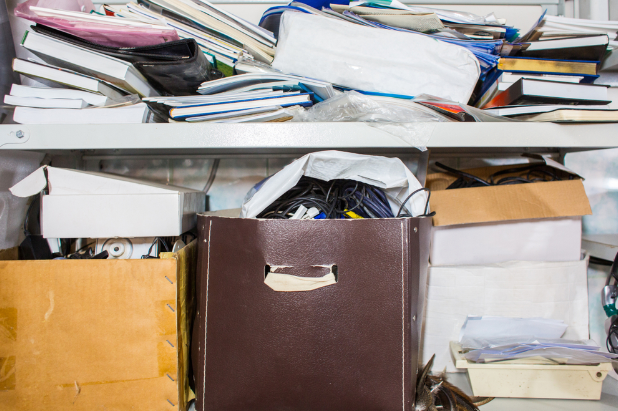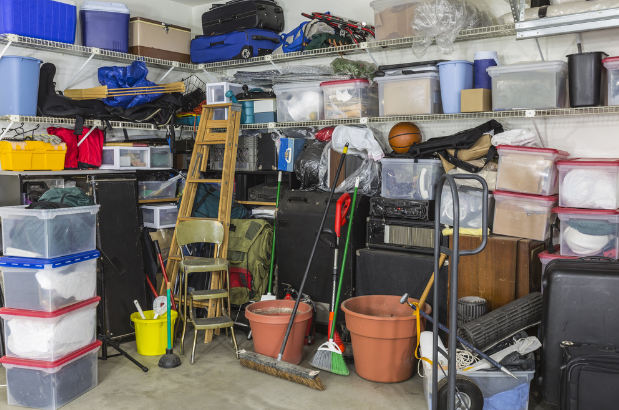Guest Post - Free Yourself From Clutter | A Simple Guide To Get You Started
Free Yourself From Clutter | A Simple Guide To Get You Started
We’ve all got a junk drawer at home. You know the one. It’s the drawer in your kitchen that accumulates just about everything. Scissors, toothpicks, three different kinds of tape, a lighter, some rubber bands, a knife cutter, a few random jelly beans for some reason, and a receipt from three years ago, among other things.
Some people don’t limit it to their junk drawer, though, and the clutter that’s in the junk drawer takes over their entire house. Every drawer is a “junk” drawer. Closets are jam-packed, and the doors won’t shut. You can’t eat at the dining room table because it’s full of mail and other...stuff. There’s not a single surface in the house that isn’t covered.
If this sounds familiar, you probably live in a cluttered home. Clutter is simply anything you don’t like, don’t use, or don’t really need. In feng shui philosophy, it’s believed free-flowing energy creates health, wealth and love. If you have clutter in your house, you probably feel the opposite of those feelings. Clutter typically produces feelings of stress, anxiety, and recklessness.
But don’t worry; if your house is cluttered, it’s not too late to fix it. The thought of getting rid of all the clutter can be very overwhelming, but it can be done. In the article below, we will talk about clutter, and how to finally get rid of it.
The Signs Your House Is Cluttered
First things first; we need to find out if your house really is cluttered. Below is a list of 10 things that are telltale signs that you have a cluttered home. If you read anything off of this list and think, “This is me!” you probably live in a cluttered home.
Your medicine cabinet is full of expired medicine
You’re embarrassed to have guests over
You have a drawer full of chords that you’re sure you need, you just don’t know why
You find something you forgot you own every time you clean
You have posters and artwork on the floors and tables, not your walls.
There are clothes in your closet with the tags on them
You have a stack of cards and letters several years old
To you, cleaning is just putting things into the correct pile
You can’t even throw away your junk mail
You have the same shirt in ten different colors
If any of these struck a chord with you, your house is probably cluttered. Some of the things listed above might not seem like a huge deal, but they are often a symptom of a much larger problem.
Where Does Clutter Come From?
So you’ve accepted that you have a problem with clutter. The first step to getting rid of your clutter is to understand where clutter comes from. All clutter stems from indecision. You have ten colors of the same shirt because you couldn’t decide which color you liked best. You haven’t hung your artwork yet because you can’t decide where you want it.
You have stuff just laying around your house because you can’t decide what to do with it, and there is clutter in your life because you haven’t taken control and decided what’s important to you. When you fail to make decisions, you end up with clutter. It’s as simple as that.
Once you start making these decisions, then the clutter starts clearing up without you really trying. When you decide that shirt looks best in blue, you don’t need the other nine. When you decide that picture you bought looks fantastic over the mantle, it’s no longer taking up space on your dining room table.
If everything in your home has a place, and you put it where it belongs, and you get rid of everything that you don’t have a space for, clutter wouldn’t exist.
Why You Should Declutter
Admitting to the problem isn’t enough. If your house is cluttered, you need to fix it. Some people tend to justify their clutter, and say things like, “I know where everything is,” or, “If I didn’t need everything here I would’ve already gotten rid of it.” Those are just excuses, and the clutter really needs to go.
When you finally declutter your home, you will instantly start noticing how things are different. First, you’ll feel an instant wave of relief. All that stress you had because of the clutter will be gone. There’s science that backs this claim too. There’s a link between high cortisol, which is a stress hormone, and people who own homes with a high density of household objects. So, the more stuff you have, the more stress you experience. Remove the stuff, remove the stress.
You won’t feel as tired anymore. That’s right, the reason you’re always so tired could be directly related to the clutter in your home. A study done by the Princeton University Neuroscience Institute found that people with cluttered homes experience exhaustion as a result of expanding mental energy on stress that’s caused by your messy environment. Also, it’s harder to focus when your house is cluttered, so you have to try harder and spend more energy doing everyday tasks.
You won’t be putting yourself in constant danger anymore, either. How many times have you tripped over something in the floor, or knocked something off of a shelf above you because it was so cluttered? Every time you walk through or do any chores in your cluttered home, you’re putting yourself in physical danger. No one needs to sprain their ankle or get a concussion because they can’t figure out what to do with all their stuff.
Time To Declutter
Decluttering your house is one of those things that is easier said than done. The clutter in your home could have accumulated over years and years of indecision. It can be incredibly overwhelming, and the process of cleaning up the clutter is often more stressful than just living in the clutter. But because of what we’ve talked about above, the payoff is worth it. Living in a clutter-free home will significantly improve your quality of life, making the stress of decluttering worth it.
But, where do you start? You can’t just grab a trash bag a box and go nuts. You need to have a plan. The absolute first thing you have to do before you can accomplish anything is believing it’s possible.
For some of you reading this, your house has probably been cluttered for so long that you’ve given up hope of ever being clutter free. If that’s you, then the first step for you is to really believe that you can do this. Your home can be clutter free. You will never get rid of the clutter in your home if you don’t remove the clutter from your mind and allow yourself to believe it’s possible.
The “Hurricane List”
When you’re ready to start, a first thing to do is to decide what you would replace if you lost everything. If a tornado or a hurricane came through and just destroyed everything you own, what would be the first few things you replaced?
Don’t do this sitting in your home. Go to a friends house a coffee shop, or the library; somewhere where you can’t see any of the stuff sitting in your house. Just sit down and make a list of everything that would be on your list to replace immediately. Don’t worry about model numbers or brand names either. If your TV is the first thing you'd replace, just write TV. Once that is done, you can go back to your house and start cleaning, armed with a list of the things that are truly important to you.
Short, Focused Bursts
Once you’re ready to clean, it is best to work in short, focused bursts. It took a long time to accumulate the stuff, so it’ll take a long time to organize it and get rid of it. Don’t expect to complete a marathon session and get it all done in one day. Make a plan that targets specific areas you’re going to declutter, clean up, and organize over an extended period of time. Then stick to that plan, so you don’t get overwhelmed.
Something that works for a lot of people is picking one room, and then working on it in 30-minute bursts. Declutter for 30 minutes, and then rest for 30 minutes. The point of this is to avoid the emotions and stress that come along with decluttering a room that hasn’t been touched in years. When you start, set a 30-minute timer, and drop whatever it is you’re doing when it goes off and walk away. Leave the space completely and allow yourself to detach for 30 minutes before you come back. Then rinse and repeat.
Utility Over Sentiment
Anyone that has decluttered their house before will tell you the absolute hardest thing to do was get rid of sentimental items. It’s very easy to get attached to things. Maybe you’ve had them since you were a kid, they have a special meaning to you, or because they represent the hard work that went into buying them. That’s completely normal; everyone has things that are sentimental to them. When you’re trying to declutter, though, you need to be able to separate yourself from those feelings.
The best way to do that is to ask yourself these questions:
What Does This Do For Me That Nothing Else Does?
Think about the utility of the item you have. Why is it unique? What does it do? Can it do more than one thing?
Do I Own Anything Else That Can Replace This?
This is the point where you line up all of your staplers and decide which one is best. Because really, who needs eight staplers? Pick the stapler that does the best job, and that holds the most value to you. The other seven aren’t necessary.
Does This Have Sentimental Meaning To Me?
When you’re deciding which appliances or electronics to keep, those first two questions are pretty easy to answer. However, when you start looking at things like old photos and knick-knacks, utility doesn’t really apply. Sentimental value is important; we’re not here to downplay what something means to you. Just try not to get overwhelmed by how much everything makes you feel versus what it does for you and how much space it takes.
You can apply those three questions to everything you own. Give yourself the appropriate time to review everything instead of deciding a room or closet is fine just the way it is. It probably isn’t. Even if it seems okay to you, that box in your office full of old papers needs to be shredded. You’ll be much happier when they’re gone and they’re not crowding you at your desk.
Take A Deep Breath And Go
This won’t be easy. This is going to take time. You aren’t on an episode of hoarders, so there isn’t going to be a fleet of dump trucks and a team of movers and psychologists that show up to help you out.
But you can do this on your own or with the help of a select few loved ones. Start out by making your plan. Take it room by room and day by day. Work in thirty-minute bursts and don’t overextend yourself and get overwhelmed.
Once you’re done, you are going to thank yourself for working so hard to get everything cleaned up. You deserve all the advantages of living in a clutter-free home.
Republished, original text here.
Author Bio: Anna Kucirkova works as a copywriter for over 4 years. She speaks 3 languages, loves traveling and has a passion for kids and writing. While she has been to many places in Europe and South East Asia, she still wants to explore the rest of the world.








